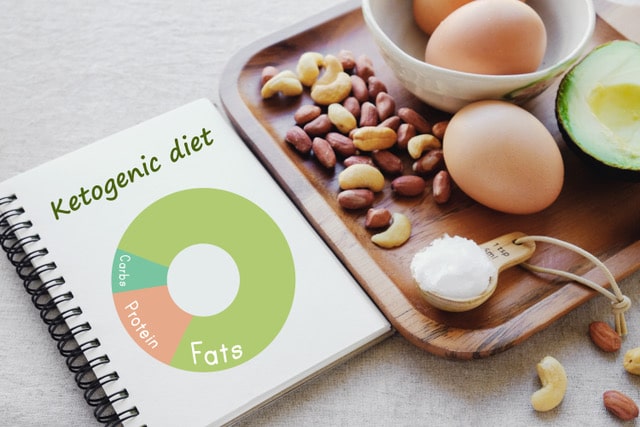Trend-setting diets come and go, but eating healthy never goes out of style. If you want to try a time-tested eating strategy that optimizes your metabolism and makes it easier to lose stubborn belly fat, the ketogenic diet might make sense for you.
Started in the 1920s, the ketogenic (keto) diet is a proven way to improve your cardiovascular health, stabilize blood glucose levels, improve insulin sensitivity, and help you maintain a healthy weight. The real question is does it make sense for YOU? Let’s dive into the details and find out!
What is the Ketogenic Diet?
Sometimes referred to as a ‘no-carb diet,’ ketogenic diets require you to focus on low-carb, high-fat, and moderate-protein foods instead of processed, simple sugars. Originally developed for epilepsy patients at the John Hopkins Medical Center, this diet doesn’t need you to count calories, limit portion sizes, or exercise excessively to follow it. Instead, the core principle of the diet is strictly limiting the amount of sugar and starch you consume.
Most people eat carb-filled diets, which allows their bodies to run on glucose (sugar) for energy, and any excess glucose at the end of the day gets put into long-term fat storage. In contrast, following a ketogenic diet cuts off your body’s glucose supply, which forces it to enter ‘ketosis’ after about 24 hours and burn your stored fat instead.
In this way, ketosis mimics a natural fasting state for your body, forcing it to improve its efficiency by fueling itself with its fat supply.

Though following a ketogenic diet requires that you eat plenty of fat and protein each day, many people find that they drop weight quickly on the plan without making other lifestyle changes.
Does this sound strangely familiar to the infamous Atkins diet? It should, but with one fundamental difference. Ketogenic diets tend to focus on consuming fats over protein, while Atkins diets require higher protein consumption each day.
Science Behind the Ketogenic Diet
To reiterate, the goal of following a ketogenic diet is to get your body to enter ketosis, a process where it switches from burning sugar to fat for energy. The absence of a quick energy supply in the form of glucose forces your liver to undergo beta-oxidation, which is the process of breaking down fat into fatty acids and glycerol. These fatty acids are then transformed into energy-rich substances called ketones, which provide a stable source of energy for your body.
How do you enter ketosis? The process is surprisingly simple.

- Cut down your consumption of carbohydrate-filled foods like processed grains, fruits, and starchy vegetables.
- Fill up on protein and natural fats like coconut oil, avocados, and salmon instead. Oh and guess what – BUTTER! You may take a double take after reading this, but you read it correctly. Consuming grass-fed butter can actually be a tool to lose fat – and the science is there to support this.
- After a certain point, your concentration of ketones rises to the point that you enter ketosis, leading to quick and consistent fat burning for as long as you remain in the state
Five Main Health Benefits of the Ketogenic Diet
Besides burning fat, are there any other health benefits from following a ketogenic diet? These five advantages might surprise you.
1. Potentially Slows the Growth of Cancer Cells
Not only does following a ketogenic diet change how your body fuels itself, but research shows it might work to ‘starve’ cancer cells as well. While normal cells can fuel themselves with sugar or fat, leading research reveals that cancer cells might not be able to make the switch. This means that cutting refined sugar out of your diet might be a natural way to reduce the growth of cancer cells.
2. Lowers Risk of Type 2 Diabetes
Burning fat instead of sugar has an unexpected benefit for your bloodstream; it causes you to become more sensitive to insulin. Carbohydrate-rich diets cause your body to release insulin, which triggers your cells to store as much energy as possible as body fat. By eliminating carbs, the ketogenic diet prevents too much insulin from being released, which regulates your blood sugar levels. As insulin resistance is an underlying cause of diabetes, a ketogenic diet can lower your risk of developing the disease.

3. Less Risk of Heart Disease
High cholesterol is a classic trigger for heart disease, and the ketogenic diet can keep your levels within the safe zone. Though the diet is high in fat, studies show that it can lower cardiovascular disease risk in obese patients, and there is evidence that following a low-carb diet for six months leads to lower levels of LDL (bad) cholesterol and elevated amounts of HDL (good) cholesterol.
4. Fights Brain Disease
Neurological issues are a serious problem, but the ketogenic diet might help your brain stay healthier. The diet has been found to be effective for treating, even reversing, neurological impairments like Alzheimer’s and Parkinson’s. In fact, the diet was initially developed to treat epilepsy. At this point, the specific reasons why a low-carb diet helps healthy brain function aren’t well understood. What is clear is that following a low-carb diet provides your brain with fat-based fuel that allows it to function more efficiently in a variety of ways.
5. Promotes Weight loss
While not everyone who follows a ketogenic diet needs to lose weight, the benefits of the lifestyle for maintaining a healthy BMI can’t be overstated. A study in the British Journal of Nutrition shows that ketogenic diets often lead to quick, substantial weight loss that participants keep off longer than traditional low-fat eating plans.
Even better, high-fat, low-carb diets will keep you feeling full between meals and rebalance your hormones so your cells don’t hold onto fat. As healthy fats and proteins tend to be filling, the plan naturally makes it easy to stay within recommended calorie limits without paying too much attention to them.
How to Follow a Ketogenic Diet Plan
Following a ketogenic diet isn’t quite as simple as cutting out refined carbs from your diet. The key to success comes from eating the right ratio of fat, protein, and even complex carbohydrates to get into a ketosis state faster and stay in it longer.
Standard Keto Diet Plan:
The traditional ketogenic diet splits your daily food consumption into 75 percent fats, 20 percent protein, and 5 percent carbohydrates. Keeping your protein levels low is crucial, as the body can transform excess protein into glucose at the beginning of your transition to ketogenic eating.
Modified Keto Diet:
Filling up on fats each day isn’t easy for many people, so a modified ketogenic diet allows you to adjust these ratios so that they are feasible for you. For example, many adults can achieve weight loss just from reducing carbohydrates to 30 percent of their diet.

Carb-Cycling:
If you struggle to keep your carb counts low, carb-cycling lets you consume carbohydrates at the right times and in the right amounts, which is usually a few times a week. Alternating your daily levels and optimizing your workout times accordingly can lead to impressive health benefits, especially for athletes who require lots of calories each day.
What Should You Eat on the Ketogenic Diet?
Filling up on the right foods in the right amounts is key to succeeding with a keto diet.
Healthy fats are an essential part of making this diet work. You can source them from heart-healthy oils like olive oil, coconut oil, grass-fed butter, and small amounts of nuts and seeds. One popular way to start your morning with a boost of fats is by making ‘bullet coffee’ with butter and coconut oil.
Unsweetened, non-starchy vegetables are also used to supplement this diet. These include anything in the cruciferous family like broccoli and kale, as well as all leafy greens and watery vegetables like cucumbers and zucchini.
Finally, protein plays a vital role in ketogenic diets. The quality of your meat is just as important as what kind it is, and ketogenic enthusiasts focus on eating grass-fed beef, cage-free eggs, pasture-raised poultry, organ meats, and even bone broth. Some full-fat dairy products are allowed, but only in moderation.
Foods to Limit On a Keto Diet
If you want to push your body into a state of ketosis, some foods are best avoided. This includes starchy vegetables like carrots, potatoes, and sweet peas, as well as beans, nuts and seeds, and full-fat dairy. While these foods are all perfectly healthy, their carbohydrate counts can prevent you from transitioning your body’s fuel supply so it burns its own fat.
Foods to Avoid On a Keto Diet
Some foods break down into glucose so quickly that they have no place in the ketogenic diet. These include all forms of sugar (even ‘natural’ sugars like maple syrup or honey), grains like pasta, bread, oats, rice, and quinoa, most processed foods, and sweetened beverages like milk and alcohol.
Potential Side Effects of the Ketogenic Diet
For most people, following a ketogenic diet is a radical change from their regular eating habits, which can lead to some negative symptoms as their bodies adjust. Often referred to as the “keto flu”, these symptoms can last as long as two weeks and include headaches, constipation, bad breath, brain fog, moodiness, and general fatigue. However, ensuring you eat quality food and get plenty of water can help you weather the adjustment period.

Especially active people can struggle with a standard ketogenic diet, so carb cycling is often a better idea for serious athletes. Carbs can be especially beneficial immediately after a workout, as they provide the muscles with easy to process glucose for quick rebuilding.
Women also should take some precaution before fully committing to the ketogenic lifestyle. Most ketogenic research to date has been conducted on men or animals, leaving some experts skeptical about whether the diet will make as much of a difference for female bodies that are naturally more sensitive to fluctuating hormone levels.
For this reason, it’s a smart idea to meet with an expert before committing to a ketogenic diet to ensure that every aspect of your health is accounted for.
Learn More about the Ketogenic Diet at The Dempster Clinic- Center for Functional Medicine
If you are ready to explore different eating strategies to optimize your health, please make an appointment at The Dempster Clinic- Center for Functional Medicine. Together, we can conduct an evaluation to learn what your health goals are, design a meal plan, and discuss the details of various diet plans.
For all first time patients, I am pleased to offer a Complimentary 15-minute Discovery Session. During this session, we will discuss your health goals and how you can benefit from our services. To make things easy for you, this session can take place over the phone or in person at the clinic.
Please consider scheduling an appointment today! I look forward to working with you soon.
Dr. John Dempster
The Dempster Clinic- Center for Functional Medicine


